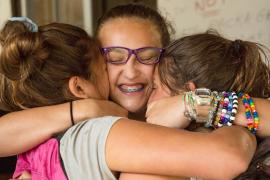The following case study is based on a real-life situation at a camp for girls in Honesdale, Pennsylvania. I have altered the names of the specific campers and some identifying information to protect their privacy.
“Erika,” Age Ten
Erika had come to camp the previous summer with a diagnosis of attention deficit disorder. She came without her stimulant medication, as her parents and the prescribing physician wanted her to have what they call a “drug-free holiday.” Her behavior at camp had been predictably impulsive, and she quickly alienated many of her peers. She often broke into conversations in ways the other girls experienced as abrupt and intrusive.
At other times she blurted out comments that offended some of her cabin mates, even though her intention was seldom ever to harm anyone. She also had difficulty keeping her bunk area clean and organized, which further antagonized her peers. As is often the case with impulse-ridden children, Erika was baffled by the negative reaction that
often came from her peers. Not only was Erika’s behavior disruptive in the cabin, it was exhausting to her counselors, who began having difficulty protecting her from her cabin mates’ disdain. By the end of the fifth week of camp the directors and Erika’s parents decided that she had done her best in her first summer at sleepaway camp and she went home early, much to the relief of both her counselors and the other girls in her cabin.
In spite of the trouble Erika had making friends, she loved camp! She cried when she had to go home early, and she begged her parents to send her back the following year. When she left camp, her parents wondered out loud about the following summer. Jane Kagan, the director of the camp, left the door open, saying they should wait to
see how Erika did during the school year. When it came time to enroll, Erika’s parents were eager to have their daughter return. As a result, Jane contacted me about the best way to proceed. Because I was already well known to the parents, Jane contacted them to say that I would be in touch with them to talk about the most effective way to have Erika return to camp. The following is a summary of the plan for Erika:
To Jane: I had a very good, detailed conversation with Erika’s mother. She has clearly thought this through and truly wants to do what is best for Erika’s success at camp this summer. Together we came up with what I think is a well-thought-out plan.
First, we will designate an adult at camp who Erika can trust, confide in, and work with as an ally in her effort to have a great summer. This “adult friend” should either be her division head or group leader — a staff member who is experienced and who may already know Erika from last summer. This adult should also be someone who has some flexibility and status at camp with whom Erika can develop a trusting relationship.
Second, Erika will be made aware of the plan and will be a participant in it. We will set up a conference call with her, her mother, you, and the person you feel is best suited to be Erika’s adult friend at camp. It will be very powerful for Erika to know that you’re directing her plan. I am also happy to have a conference call with you and the person you think is best in the role of Erika’s adult friend to clarify the scope and aim of their relationship.
The plan is as follows:
1. Erika will come to camp not on her medication but with her medication, so if we decide it is best for her go on it, it’ll be available in the health center. This deci- sion will, of course, be made in consultation with Erika’s physician. I explained to Erika’s mother that some physicians who prescribe psycho-stimulant med- ication for children with ADHD are not familiar with the social and physical They don’t realize that having good focus and being able to control one’s im- pulses is critical to making friends and being happy at camp. Erika’s mother was very grateful to have this understanding. She has grant- ed us permission to speak with Erika’s doctor.
2. Erika will check in with her adult friend two or three times a week, especially with regard to making and keeping friends in her cabin and at camp in general. The adult will look for the following:
a. How Emma is feeling about her friendships in her bunk
b. How happy she is overall
c. How she’s been sleeping
d. Whether she has been getting enough gross motor activity in her schedule (see below)
e. If she has been irritable or is beginning to feel irritable
Her “friend” can also coach her with regard to specific friendships with peers.
3. Erika will have at least two gross motor activities a day, such as soccer, swimming, Zumba, dance, yoga, or gymnastics. These are activities where she will do a lot of running, jumping, or moving. Like a lot of children with ADHD, gross motor activities help her maintain her equilibrium (mood, sense of calm, lower irritability). Being physically tired will also help her sleep better at night. Sleep is critical for kids like Erika.
4. Erika will also bring a journal to camp, which she can use to write or draw in when she needs “chill time” — down time that Erika can ask for or that her group leader or counselor or adult friend can sug- gest as a way of helping Erika keep a calm demeanor. What we find with kids who have ADHD is that they expend more energy than most other kids just trying to control their impulses and stay focused. Because the mental and emotional effort can be exhausting for kids with ADHD, I recommend they get some chill time just to be peaceful and recharge their batteries.
The plan should be reviewed first by you and Erika’s mother (feel free to forward this summary to her). Erika should then be brought into the conversation with you and her go-to staff member whom you’ve chosen. In that conversation you should ask Erika what she is looking forward to this summer, and what she wants to do to have a great summer. These goals should be worked into the plan.
Two other points will need to be made with Erika while on this call:
- Camp is especially challenging, given that you suddenly inherit a bunch of sisters with whom you have to share everything. And you don’t get much of a break from your friends at camp like you do at home, so if she begins to feel tired, irri- table, or a little overwhelmed and the adults decide she should go on her meds, that she realizes it is not because she has failed but because camp life is more demanding than home life. (Again, her prescribing physician needs to sign off on this plan as well.)
- Everyone wants Erika to have a great summer and to create a good feeling so she never feels in danger of hitting anyone, which happened last summer. We know that if she did hit someone it would make her feel bad, sad, and upset.
Above all, we want Erika to be able to stay at camp and be happy, which is why we created this plan and why she is a part of making it happen!



